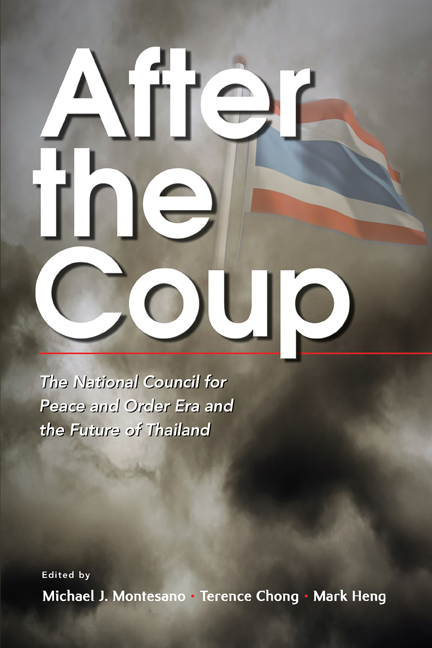Book contents
- Frontmatter
- Contents
- About the Contributors
- 1 Introduction: Thai Realities and Possibilities after the 22 May Coup
- 2 The Rise of the Thai Upper Middle Class and its Turn against Democracy
- 3 “We the Southerners Come to Protect the Nation and the King”: Southerners’ Political Rise and Regional Nationalism in Thailand
- 4 Exit, Voice, (Dis)loyalty? Northeast Thailand after the 2014 Coup
- 5 The Red Shirts and their Democratic Struggle in Northern Thailand, April 2010 – May 2015
- 6 The Shifting Battleground: Peace Dialogue in Thailand's Malay-Muslim South
- 7 Thailand's Zigzag Road to Democracy: Continuity and Change in Military Intervention
- 8 Murder and Regress: Violence and Political Change in Thailand
- 9 Thailand's Politics of Decentralization: Reform and Resistance before and after the May 2014 Coup
- 10 Change and Continuity in the Politics of the Media after the Coup
- 11 Thailand's Royal Democracy in Crisis
- 12 The Foreign Press and its Changing Perceptions of the Thai Monarchy
- 13 Thai Economic Growth: Retrospect and Prospect
- 14 Features and Challenges of an Ageing Population in Thailand
- 15 Conclusion: Thailand in Transition
- Bibliography
- Index
6 - The Shifting Battleground: Peace Dialogue in Thailand's Malay-Muslim South
Published online by Cambridge University Press: 23 May 2019
- Frontmatter
- Contents
- About the Contributors
- 1 Introduction: Thai Realities and Possibilities after the 22 May Coup
- 2 The Rise of the Thai Upper Middle Class and its Turn against Democracy
- 3 “We the Southerners Come to Protect the Nation and the King”: Southerners’ Political Rise and Regional Nationalism in Thailand
- 4 Exit, Voice, (Dis)loyalty? Northeast Thailand after the 2014 Coup
- 5 The Red Shirts and their Democratic Struggle in Northern Thailand, April 2010 – May 2015
- 6 The Shifting Battleground: Peace Dialogue in Thailand's Malay-Muslim South
- 7 Thailand's Zigzag Road to Democracy: Continuity and Change in Military Intervention
- 8 Murder and Regress: Violence and Political Change in Thailand
- 9 Thailand's Politics of Decentralization: Reform and Resistance before and after the May 2014 Coup
- 10 Change and Continuity in the Politics of the Media after the Coup
- 11 Thailand's Royal Democracy in Crisis
- 12 The Foreign Press and its Changing Perceptions of the Thai Monarchy
- 13 Thai Economic Growth: Retrospect and Prospect
- 14 Features and Challenges of an Ageing Population in Thailand
- 15 Conclusion: Thailand in Transition
- Bibliography
- Index
Summary
The year 2004 brought a dramatic surge of violence in Thailand's southernmost region, which has now claimed nearly seven thousand lives. In the 2016 Global Terrorism Index, Thailand ranked fifteenth among the 163 countries surveyed for being affected by “terrorism” (Institute for Economics and Peace 2016, pp. 10–11). Despite the relatively high death toll resulting from political conflicts in the southernmost Thai provinces of Pattani, Yala and Narathiwat and adjacent parts of Songkhla, the insurgency there remains at the periphery of public attention both at home and abroad. For almost a decade, the Thai state tried to defeat the militants by suppression and co-optation, but this approach had little effect in putting a permanent end to the conflict. “Negotiation”, or kancheracha, was a taboo — an idea that the Thai state, and particularly the Thai military, strongly opposed. Nevertheless, a significant policy shift came on 28 February 2013, the day that a formalized peace dialogue between the Bangkok government and the Barisan Revolusi Nasional Melayu Patani (Patani Malay National Revolutionary Front, BRN) was launched. The BRN is an active armed movement seeking to liberate from Thailand what it considers a previously independent sultanate. It is widely perceived to be the strongest among Patani liberation groups in terms of military capability.
This chapter examines how peace initiatives in southern Thailand have unfolded. In particular, I examine how the formalized peace process has changed the dynamic of armed conflict in southern Thailand. The formalized peace dialogue has significantly opened a new front of political contestation and negotiation. It has therefore allowed conflicting parties, particularly the various liberation movements, to bring their grievances concerning ethnic, religious and cultural discrimination and demands for self-governance to bear. It has also allowed them to search for political solutions in a non-violent manner. However, this initiative has encountered challenges from hardliners on both the government and the insurgent sides. The first section of the chapter provides a brief review of state initiatives to establish channels of communication and dialogue with Malay-Muslim insurgents. The chapter then discusses the 2013 formal peace dialogue conducted under the government of Yingluck Shinawatra. The following section examines the resumption of peace dialogue under the military government installed after the May 2014 coup. The chapter concludes with observations on the development of formalized peace dialogue and its prospect for conflict resolution.
- Type
- Chapter
- Information
- After the CoupThe National Council for Peace and Order Era and the Future of Thailand, pp. 140 - 169Publisher: ISEAS–Yusof Ishak InstitutePrint publication year: 2019



